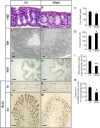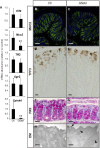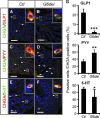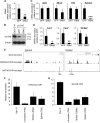GATA6 is required for proliferation, migration, secretory cell maturation, and gene expression in the mature mouse colon
- PMID: 22733991
- PMCID: PMC3422006
- DOI: 10.1128/MCB.00070-12
GATA6 is required for proliferation, migration, secretory cell maturation, and gene expression in the mature mouse colon
Abstract
Controlled renewal of the epithelium with precise cell distribution and gene expression patterns is essential for colonic function. GATA6 is expressed in the colonic epithelium, but its function in the colon is currently unknown. To define GATA6 function in the colon, we conditionally deleted Gata6 throughout the epithelium of small and large intestines of adult mice. In the colon, Gata6 deletion resulted in shorter, wider crypts, a decrease in proliferation, and a delayed crypt-to-surface epithelial migration rate. Staining techniques and electron microscopy indicated deficient maturation of goblet cells, and coimmunofluorescence demonstrated alterations in specific hormones produced by the endocrine L cells and serotonin-producing cells. Specific colonocyte genes were significantly downregulated. In LS174T, the colonic adenocarcinoma cell line, Gata6 knockdown resulted in a significant downregulation of a similar subset of goblet cell and colonocyte genes, and GATA6 was found to occupy active loci in enhancers and promoters of some of these genes, suggesting that they are direct targets of GATA6. These data demonstrate that GATA6 is necessary for proliferation, migration, lineage maturation, and gene expression in the mature colonic epithelium.
Figures







References
-
- Al-azzeh ED, Fegert P, Blin N, Gott P. 2000. Transcription factor GATA-6 activates expression of gastroprotective trefoil genes TFF1 and TFF2. Biochim. Biophys. Acta 1490: 324–332 - PubMed
-
- Ayanbule F, Belaguli NS, Berger DH. 2011. GATA factors in gastrointestinal malignancy. World J. Surg. 35: 1757–1765 - PubMed
-
- Bachmann O, et al. 2004. The Na+/H+ exchanger isoform 2 is the predominant NHE isoform in murine colonic crypts and its lack causes NHE3 upregulation. Am. J. Physiol. Gastrointest. Liver Physiol. 287: G125–G133 - PubMed
-
- Barker N, et al. 2007. Identification of stem cells in small intestine and colon by marker gene Lgr5. Nature 449: 1003–1007 - PubMed
Publication types
MeSH terms
Substances
Grants and funding
LinkOut - more resources
Full Text Sources
Molecular Biology Databases
